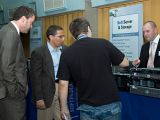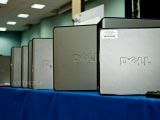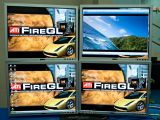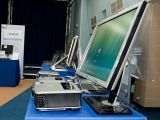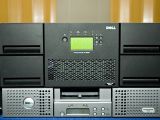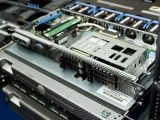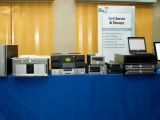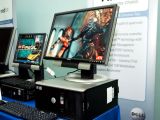On the 14th of May I attended Dell's Technology and Solutions Tour held in Bucharest. Since there is much to cover on such a complex event as this one, I will be referring only to the main points of interest. In general, Dell only holds conferences whenever they need to explain (and in some cases to prove the usability of) some new concepts. And the "Simplifying the IT one" seems like a big deal, especially if I'm to think about the presentation held by Mark Boulton, Director of Enterprise Marketing for Dell EMEA.
I have to say that the presentation itself was pretty impressive as it "touched" some particularly interesting issues, most of them related to this very concept (check the title!). Mister Boulton started the press conference with a quick introduction related to Dell's marketing strategy. The introduction was brief (as expected when dealing with important changes) and evolved around a single point: the service business.
On this occasion, I found out that most of Dell's business is represented by the server market and that they hold the Nr. 1 spot on USA (both servers and retail PC market). Worldwide, Dell is currently glued to the Nr. 2 spot, given the constant expansion of HP in the client-server solutions. And it possesses some 11 fulfillment and manufacturing sites, 5 design centers, 5 enterprise command centers and 2 service ops centers. But enough with the numbers...
The presentation itself revealed some interesting facts about Dell's future plans. According to Mr. Boulton, currently, there is a discrepancy between the amount of data held by portable storage solutions and a given budget. And due to the constant increase of the number of connected devices, a company such as Dell requires improved logistics in order to produce solutions in a given time frame.
Regarding the constant growing of the portable segment, Mr Boulton declared: "Dell Currently holds about 78000 employees which use more than 100000 portable devices. As a result there is an exponential dependency between the number of connected devices and a period of time". Regarding this very issue, Mark Boulton also stated that "more devices will be connected in the next 5 years than in the last 15".
Evidently, this can only translate into faster data centers with more storage space and more skilled engineers ready to develop backup solutions for any given client working in a 24/7 environment. Mark Boulton also said that there is a dependency between the capabilities of a network and its target. And since currently "a network is being used for a lot more things than it used to", the webmaster needs to maintain a proper level of "performance and security" while at the same time offering the needed bandwidth for any type of transmission.
This reasoning is not without its flaws. As Mr. Boulton continued to explain, the majority of the IT's budget is tied up maintaining systems and only a minority is allocated to innovative projects that could drive the business to a new level of performance. "Everything is growing but the budget is not", said Mark Boulton.
If this were the matrix, it would be the proper moment to ask the "Why are you here?" question. And while the question alone won't give a proper solution to Dell's problem it will still deliver some answers. According to Dell's internal roadmaps, about 9% of the total budget of a company is spent on innovation. And it should be bigger, a lot bigger. "Innovation adds new functionality... increase the 9% and decrease the rest". Could it be simpler?
You might wonder what's the connection between "The Green PC" and the 9% (a.k.a Innovation). Well, there is a very strong one. Actually, Dell strongly believes that there is only one way you can effectively increase the 9% and that can only be achieved by acting in two separate directions at the same time. 1:"Reduce the power consumption" and 2: apply the "Simplification" concept.
However, it's not in everybody's interest to simplify things. Some even like to keep all the mystery to themselves in order to maintain a level of control (and profit). On the other hand, Dell doesn't like that. Actually Mark Boulton stated that: "We want people to spend less on maintaining their hardware" because currently, "very few people are managing their data efficiently".
I have to give Dell the upper hand here since what they actually want is to be able to "deploy very complex solutions very fast... the key of a good software is to already ship it optimized and pre-tested for on a specific hardware so that the customer won't waste any time. IT gives a business the competitive advantage. From desktop to data center everything has to work flawlessly and at the same time be as energy efficient as possible... We design all out products with energy efficiency in mind"
So there you have it. That's Dell's green PC concept and as it turns out it stretches beyond the plain PC as Dell is currently promoting efficiency throughout its entire product line. And in order to offer a more in-depth analysis, Mr. Boulton presented some of Dell's latest portables from the Latitude line, namely the ATG, D630 and D830.
Of course, we couldn't "eat-it up" without saying anything; so, at the end of the presentation, we managed to ask Mr. Boulton some questions regarding the future of Dell's XPS line inside the "green PC" concept.
Softpedia: Mr. Boulton, how can you link the presence of the overclocked XPS710 to the "energy efficient" concept?
Mark. Boulton: "As far as the XPS line goes, the fact that it is oriented towards gaming means that we have to make some compromises regarding the power draw and cooling of such a device". Nice one actually and yes, that answer crossed my mind but what I really don't understand is where Alienware fits into this picture. If XPSes have to make "some compromises" than Alienware's will probably start a riot. Oh well it's another case of "muscle car vs. small but economical car" issue.
Softpedia: Are you planning to offer an SSD-only storage unit on your Latitude portables?
M.B: "I can't tell you a specific date but this idea has been also taken into account. Currently we only offer an SSD drive as an option for our ATG and D420 Latitude series but we are planning to offer an SSD drive (as an option) also on bigger models. Of course that doesn't mean we will be phasing out classical storage".
Later on, I managed to talk to one of Dell's engineers working on the Latitude line which gave me some extra info on that matter. It seems that the Robson platform will keep its Turbo Memory and depending on the configuration, its hard drive encryption, but it will also offer SSDs for most of the Latitude line.
Softpedia: Judging by the latest benchmarks, INTEL's Xeons have once again regained the No. 1 spot in server benchmarks. In the near future, will you also continue to offer Opteron-based servers?
M.B: "There's no point in changing our strategy at the moment. Both out partners will hold their positions. As far as AMD is concerned, Opterons are great performers and our AMD server line is a success. Of course there will always be a performance gap between the two but that will only force the slower performer to produce a faster solution than its competitor."
That doesn't mean classical hard drives will disappear, since for the moment, they still have the upper hand when it comes to transfer rates and price/GB. What's more interesting about the SSDs is that when I visited the server booth (which by the way displayed some gorgeous rack mountable Opteron 4-way SAS enclosures) I got approximately the same answer from one of their server engineers.
According to Dell's officials: "SSDs are faster only on random reads. It all depends on your purpose. If you require random reads and your server does a lot of caching, a SSD array will probably be perfect for you. But if you need high transfer rates, classical hard drives are still a lot faster."
After the conference, Dell showcased some of its most impressive pieces of hardware including a marvelous XPS710 H2C gaming system and lots of Precision compact servers. Most pictures can be seen below; but if you want more details, Dell's website should do the trick.
In the end, I have a mixed opinion regarding Dell's power tour. I understood Mr. Boulton's presentation, but every time I think about it a thing keeps popping into my head. 10 years ago, I had a Pentium CPU cooled by a radiator and fueled by a 200W AT PSU. There was a single fan running inside the PSU (which eventually died of old age). In today's terms, my Symbian phone would probably be faster. But what about the "greener" part?
The problem is you can never go back to simplicity. Once you've crossed that point and your daily-use CPU keeps gaining more cores and more transistors, things will never be simple. Maybe you can make it more energy efficient, but due to the SOI technology, as soon as a new miniaturization process will occur, the CPU will gain even more cores. And yes, it will perform faster but it won't dissipate less heat.
I really hope that Dell manages to put all that planning into practice. I like the "Simplicity" concept and I'm also a fan of the "Green PC". And I guess that if they manage to implement these concepts, others will soon follow. On the other hand, such a strategy can only work if it's properly backed up by chip manufacturers. Somehow, I don't think that AMD will lower Agena's frequency just to be greener (and slower) than the latest Core 2 Duo. I simply don't.
Photo: Tudor Raiciu for Softpedia.com
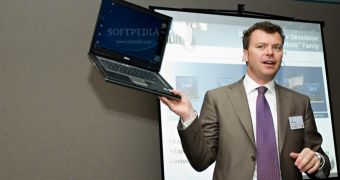
 14 DAY TRIAL //
14 DAY TRIAL // 
